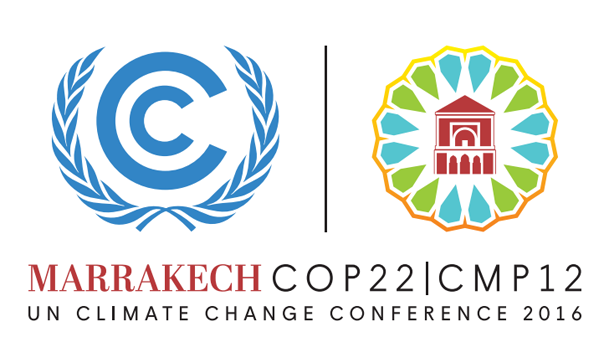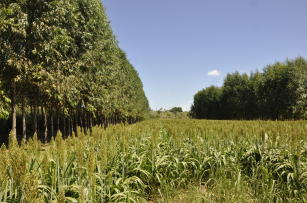Brasil apresenta na COP22 produção agrícola com preservação ambiental e mitigação de CO2
Brasil apresenta na COP22 produção agrícola com preservação ambiental e mitigação de CO2
Aumentar a produção agrícola mantendo a qualidade de seus produtos, reduzir as emissões de gases de efeito estufa (GEEs) na agropecuária e, ao mesmo tempo, preservar a maior biodiversidade do planeta. Esse panorama promissor do Brasil foi apresentado pelo ministro da Agricultura, Blairo Maggi, durante a Conferência da Organização das Nações Unidas sobre Mudanças Climáticas (COP22) realizada esta semana em Marrakesh, em Marrocos, e que reúne políticos, cientistas, ONGs e empresas para debater a aplicação do acordo sobre o clima de Paris. O presidente da Embrapa, Maurício Antônio Lopes, também faz parte da comitiva brasileira na Conferência.
Embasado no bom desempenho ambiental do setor agropecuário de hoje, Maggi acredita que o País é capaz de responder a grandes desafios mundiais apresentados pela ONU como o aumento da produção de alimentos para uma população mundial crescente, adaptação de sistemas produtivos e a mitigação dos gases de efeito estufa. O Ministério da Agricultura, Pecuária e Abastecimento (Mapa) prevê que o setor agropecuário nacional deverá reduzir as emissões de CO2 equivalente em 0,9 gigatoneladas no período entre os anos de 2005 e 2030.
Os resultados ambientais do setor agropecuário nacional devem-se, especialmente, ao Plano Setorial de Mitigação e de Adaptação às Mudanças Climáticas para a Consolidação de uma Economia de Baixa Emissão de Carbono na Agricultura (Plano ABC). Coordenado pelo Mapa, o Plano preconiza práticas sustentáveis que promovem a redução de emissões e retenção de carbono como a recuperação de pastagens degradadas, o plantio direto na palha, o plantio de florestas e a integração lavoura-pecuária-floresta (ILPF).
As áreas produtivas com sistemas de ILPF já somam no Brasil 11,5 milhões de hectares, de acordo com pesquisa patrocinada pela Rede de Fomento de Integração Lavoura-Pecuária-Floresta, elaborada pelo Kleffmann Group, com acompanhamento técnico da Embrapa Meio Ambiente (SP).
Outro aspecto importante frisado pelos representantes do Brasil em Marrakesh foi o potencial de preservação de vegetação nativa nas fazendas, prevista no Código Florestal do País. A comitiva brasileira frisou no evento que as áreas de preservação mantidas dentro das propriedades rurais brasileiras corresponde aos territórios da França e da Noruega somados. Por conta desses esforços, o ministro da Agricultura defendeu no evento que os produtos agrícolas brasileiros tenham preferência no mercado global, em função de cumprirem regras ambientais rigorosas.
Entre as metas assumidas pelo Brasil na COP21 até o ano de 2030, o setor agrícola se propôs a contribuir com a recuperação de 15 milhões de hectares de pastagens, aumentar em cinco milhões de hectares de sistemas ILPF e fornecer matérias primas para biocombustíveis como etanol e biodiesel que deverão responder por 18% do consumo energético nacional em 2030, de acordo com as previsões do governo. Por essas razões, o País coloca-se na Conferência como ator-chave na produção sustentável de alimentos e em produção de serviços ambientais.
"Somando-se as metas voluntárias assumidas anteriomente com o compromisso ratificado pelo País por meio da NDC, o Brasil se compromete a trabalhar 55,5 milhões de hectares e mais 12 milhões para recuperação e recomposição de florestas, o que representa mais de um quarto de todas as terras usadas pela agropecuária, nenhum outro país assumiu uma proposta tão audaciosa", ressalta o pesquisador da Embrapa Meio Ambiente, Celso Manzatto coordenador da Plataforma ABC, iniciativa multi-institucional por monitorar no País, a adoção de tecnologias de Baixa Emissão de Carbono na agropecuária.
Para Manzatto, a Plataforma será um valiosa iniciativa tanto para validar os resultados alcançados pelo Brasil e, posteriormente, poder gerar dados confiáveis para uma certificação voltadas a produtos agropecuários sustentáveis, quanto ferramenta para disseminar a adoção dessas tecnologias nas mais diferentes condições produtivas do país. "A ideia é uma plataforma multi-institucional com participação ativa da iniciativa privada a qual tem interesse na abertura e consolidação de mercados e na certificação de uma produção sustentável", conta o pesquisador.
Para o presidente da Embrapa, o Brasil concentra todas as condições para se tornar líder mundial em intensificação baseada em tecnologias "poupa-recursos", de baixa emissão de carbono e em ganhos na produtividade da terra. De acordo com Maurício Lopes, o País é um dos poucos do mundo com grandes extensões de terra com aptidão para uso sustentável.
Histórico
A discussão mundial sobre mudanças climáticas teve seu marco legal na Conferência das Nações Unidas sobre o Meio Ambiente e o Desenvolvimento, em 1992, também conhecida como Eco-92, quando foi elaborado o tratado internacional conhecido como Convenção-Quadro das Nações Unidas sobre Mudança do Clima. Os princípios fundamentais que trariam as diretrizes a serem seguidas por diversos países do globo na tentativa de mitigar os efeitos dessa mudança começaram daí e passaram a ser debatidos e negociados, anualmente, em reuniões do foro internacional denominadas Conferência das Partes da Convenção-Quadro da ONU sobre Mudanças Climáticas (COP).
O Brasil, desde o início, esteve envolvido nas reuniões das Partes. Dos diferentes aspectos discutidos a cada ano, a agricultura é, sem dúvida, uma das vertentes mais importantes para mitigação dos efeitos das mudanças climáticas. Em termos governamentais, essa vertente é tratada oficialmente na COP pelo Mapa que conta com o apoio da Embrapa, por meio de sua base de pesquisas e soluções tecnológicas para o segmento.
No contexto dos compromissos assumidos nas COPs e com o apoio técnico da Embrapa, o Mapa vem implementando políticas nacionais significativas para que o país possa atingir metas definidas pela Convenção. Exemplo disso é o Plano ABC (surgido no âmbito da COP15) e, mais recentemente, o Plano Nacional de Adaptação à Mudança do Clima, aprovado em maio de 2016.
A partir do Acordo de Paris, assinado na COP21, foram institucionalizados os compromissos de contribuição brasileiros, chamados Contribuição Nacionalmente Determinada (intended Nationally Determined Contribution – iNDC, sigla em inglês). Após a assinatura, o acordo passou a ser chamado de NDC Brasil e inclui, entre suas contribuições, ações de mitigação, adaptação e meios de implementação para alcance dos objetivos que o país se propôs.
O pesquisador da Secretaria de Relações Internacionais (SRI), Gustavo Mozzer, que já integrou diversas missões do Mapa nas reuniões da COP, explica que o Acordo de Paris leva em consideração o agravamento da questão ambiental e a importância do investimento em agendas estruturantes, priorizando a adaptação dos efeitos negativos da mudança do clima.
Nesse Acordo, ainda segundo Mozzer, as contribuições para o setor agrícola tratam, em particular, de conciliar a necessidade de avançar a produção agrícola com a redução da intensidade de emissões do setor.
O Plano Nacional de Adaptação deve complementar as ações que já vinham sendo realizadas no âmbito do Plano Nacional de Mudanças Climáticas, que tem mostrado resultados efetivos por meio do Plano ABC, como a disseminação de tecnologias economicamente atraentes e ambientalmente sustentáveis. Tecnologias decorrentes de pesquisas da Embrapa e que promovem ganhos para os sistemas produtivos em termos de resiliência às intempéries do clima e ainda reduzem a intensidade de emissões de gases do setor agrícola.
As discussões
A primeira meta que deu base ao estabelecimento de ações para mitigação de efeitos das mudanças climáticas foi definida ainda na COP3, em 1997, no Japão, na forma do Protocolo de Quioto. No tratado, com mais de 170 países signatários, foi proposto um calendário no qual tais países teriam a obrigação de reduzir a emissão de gases do efeito estufa em, pelo menos, 5,2% em relação aos níveis de 1990, no período de 2008 a 2012.
Desde a COP 15, realizada em 2009, em Copenhagen, na Dinamarca, a participação da Embrapa vem crescendo, por meio do apoio ao Mapa no desenvolvimento de ações na agricultura a serem utilizadas no Brasil. Das discussões, surgiram as Ações de Mitigação Nacionalmente Apropriadas (NAMAS), compromissos brasileiros, acordados de forma voluntária pelo país e registrados durante a COP 15. As NAMAs antecederam os compromissos acordados depois na NDC.
Naquele momento, para Mozzer, o país foi pioneiro ao tratar da importância de ações de adaptação aos efeitos da mudança do clima para o setor agrícola nas negociações internacionais. "Durante a construção do Plano ABC, entre 2009 e 2010, houve um capítulo dedicado ao tema de adaptação, sendo o Plano brasileiro o único plano setorial que contemplou esse tema", conta.
A participação da Embrapa nos debates das COPs e de foros paralelos à Convenção tem permitido à Empresa contribuir com a discussão nacional e internacional sobre como a agricultura atuará em respeito às mudanças climáticas. Na COP 22, que começou no último dia 7 de novembro, a discussão continua na busca por definir ações que visem o "dimensionamento de impactos, o fomento de políticas públicas e o avanço no conhecimento de antever e mitigar riscos", diz o pesquisador.
Saiba mais
A Conferência das Partes da Convenção-Quadro da ONU sobre Mudanças Climáticas é uma cúpula internacional, formada por representantes de mais de 190 países, que discutem as bases das negociações para o estabelecimento um acordo internacional.
O Protocolo de Quioto é um tratado internacional com compromissos para a redução da emissão dos gases que agravam o efeito estufa. Foi implantado efetivamente em 1997, quando metas de redução da emissão de gases poluentes foram estabelecidas.
Acompanhe a Embrapa na #COP22
Fábio Reynol (MTb 30.269/SP)
Secretaria de Comunicação Embrapa
Contatos para a imprensa
secom.imprensa@embrapa.br
Telefone: (61) 3448-2064
Cristiane Vasconcelos (MTb 1639/CE)
Secretaria de Comunicação Embrapa
Contatos para a imprensa
secom.imprensa@embrapa.br
Mais informações sobre o tema
Serviço de Atendimento ao Cidadão (SAC)
www.embrapa.br/fale-conosco/sac/



